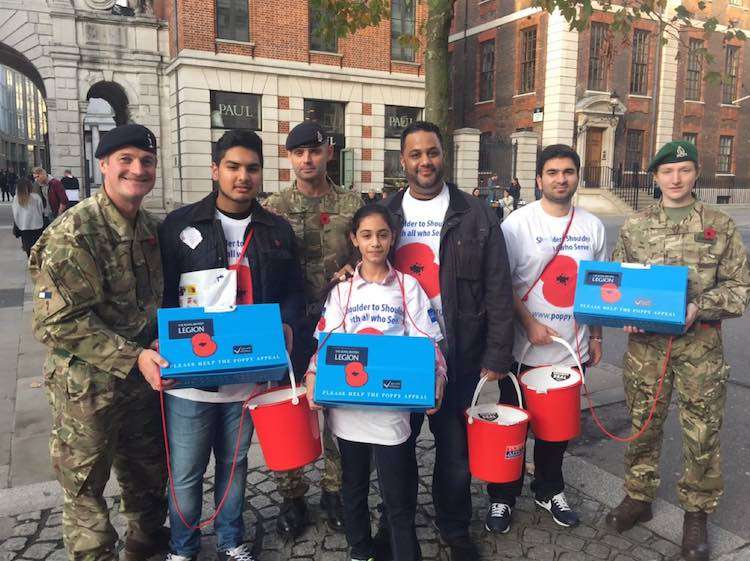Christians and Jews are making it easier for Britons to be more comfortable with Muslims as part of their national culture by joining members from local Mosques in the UK tradition of selling red poppies to benefit veterans–and by reminding everyone that nearly 400,000 Muslims fought as British soldiers in World War I.
Since 1921, British civilians have purchased the artificial red poppies and proudly pinned them to their lapels as a symbol of remembrance for veterans of war. The annual Royal British Legion Poppy Appeal has, for over 90 years, raised millions annually to support UK veterans and their families.
In the weeks leading up to today's Remembrance Sunday ceremonies, Christians, Jews, and Muslims have joined together on sidewalks raising money and fostering unity in the community through the £1 poppy sales.
"Remembering how Muslims, Jews and Christians stood side-by-side to defend Britain in both World Wars reminds us of the shared history and British identity that is common to us all," Imam Qari Asim told the Yorkshire Evening Post.
One young charity, The Ahmadiyya Muslim Youth Association, Tahir Region, has tweeted photographs of some of their members posing with UK troops while out selling poppies.
Youth From Ahmadiyya Muslim community Supporting the Poppy Appeal ! #Loyalty @David_Cameron #mypoppy #PoppyAppeal pic.twitter.com/NSU1AroS1t
The Independent reported last year that one million Muslims in the UK, to show solidarity with fellow Britons, wore the poppies on Remembrance Day (the second Sunday of the month, nearest to November 11, Armistice Day, the anniversary of the end of hostilities in the First World War).
Although more than 400,000 Muslims served in the British Army during that war, very few people in the U.K. know it. A survey by British Futures found that only about one in five Britons were aware that Muslims fought for the UK and only 2% knew the scale.
Since 1921, British civilians have purchased the artificial red poppies and proudly pinned them to their lapels as a symbol of remembrance for veterans of war. The annual Royal British Legion Poppy Appeal has, for over 90 years, raised millions annually to support UK veterans and their families.
In the weeks leading up to today's Remembrance Sunday ceremonies, Christians, Jews, and Muslims have joined together on sidewalks raising money and fostering unity in the community through the £1 poppy sales.
"Remembering how Muslims, Jews and Christians stood side-by-side to defend Britain in both World Wars reminds us of the shared history and British identity that is common to us all," Imam Qari Asim told the Yorkshire Evening Post.
One young charity, The Ahmadiyya Muslim Youth Association, Tahir Region, has tweeted photographs of some of their members posing with UK troops while out selling poppies.
Youth From Ahmadiyya Muslim community Supporting the Poppy Appeal ! #Loyalty @David_Cameron #mypoppy #PoppyAppeal pic.twitter.com/NSU1AroS1t
The Independent reported last year that one million Muslims in the UK, to show solidarity with fellow Britons, wore the poppies on Remembrance Day (the second Sunday of the month, nearest to November 11, Armistice Day, the anniversary of the end of hostilities in the First World War).
Although more than 400,000 Muslims served in the British Army during that war, very few people in the U.K. know it. A survey by British Futures found that only about one in five Britons were aware that Muslims fought for the UK and only 2% knew the scale.
British Futures has launched a campaign with New Horizons in British Islam, to make Britons aware of the sacrifice made by the Islamic faithful for the UK.
"The story of Muslim contribution to the British Army of the First World War is little-known among the public," Dilwar Hussain, Chair of New Horizons in British Islam said. "Many British Muslims themselves don't realise the relevance of the WW1 centenary to their own history."
Photo by Ahmadiyya Muslim Youth Association










Be the first to comment